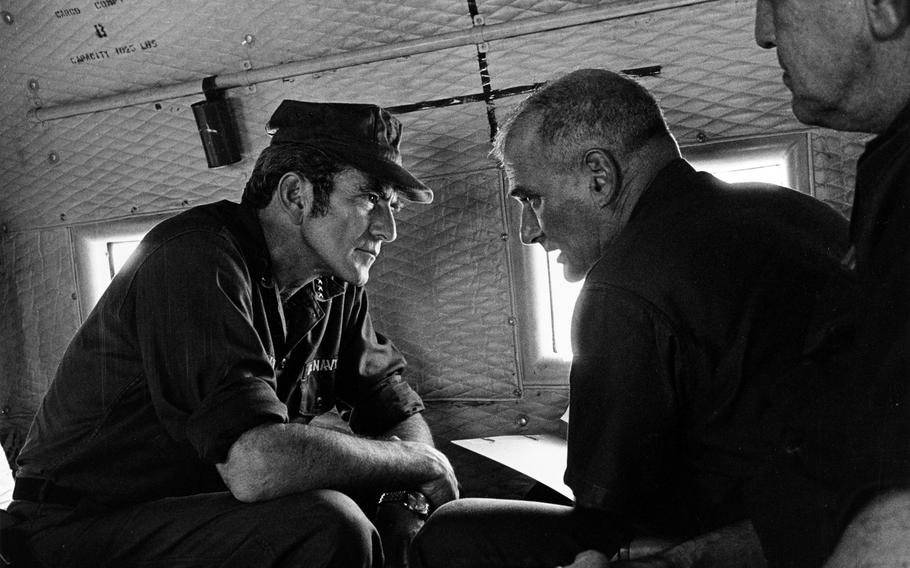
Chief of Naval Operations Adm. Elmo R. Zumwalt Jr. (left) and Rear Adm. Robert S. Salzer, Commander Naval Forces Vietnam, discuss their recent visit to Nam Can Naval Base in Vietnam in May 1971. (U.S. Navy)
The U.S. Navy announced last month it is set to miss fiscal year 2023 recruiting goals for enlisted sailors by almost 16%. Unbelievably, to address the shortage, it opted to take a “Bud Light”-like marketing approach.
Anheuser-Busch (Budweiser) — producer of the most popular low calorie beer Bud Light — triggered negative publicity earlier after partnering with transgender TikTok star Dylan Mulvaney. Its marketing campaign produced the beer in cans with Mulvaney’s image, enraging Budweiser’s customer base, reflected by a $6 billion loss in sales.
Nonetheless, the Navy adopted a similar Bud Light recruiting approach — using a drag queen to signal a more diverse recruitment effort. How the Navy believed this would somehow entice recruitment among Generation Z is baffling. But the response again has been overwhelmingly negative. Regardless of the mandate that all humanity be treated equally, planting the seed those considering military service might have to live in close quarters with drag queens is not the way to do it.
The fact no senior Navy official stopped this disastrous marketing campaign is telling. It suggests they are so intimidated by their commander in chief — a man who didn’t serve in the military and is today blindly driven by the diversity, equity and inclusion (DEI) ideology — they fail to promote the Navy’s best interests, instead choosing to remain silent. Hopefully, they will step up to stop President Joe Biden’s plan also to transition all military vehicles to electric within the next 10-15 years — an asinine idea that will expose our military to immense danger.
Promoting DEI does not meet the Navy’s best interests or those of any of our military services. Instead, they should be promoting a “Three Musketeers” mentality of “one for all and all for one.” No single group – whether a minority or a majority in the services – should be portrayed as receiving “special” attention.
Spending 26 years in the Marine Corps, serving in three conflicts alongside a wide range of Marines from diverse backgrounds, what remained important to me was that we were all driven by that “one for all and all for one” mentality. A Marine’s race, faith, political beliefs, etc. meant nothing — a common bond of mutual respect and professionalism meant everything.
Reading about the Navy’s Bud Light-like recruiting program caused me to reflect upon a Navy recruiting program half a century earlier suffering from problems of retaining personnel during an unpopular Vietnam War.
But in 1970, a very innovative admiral became Chief of Naval Operations at age 49 — the youngest admiral ever to do so, implementing changes (known as Z-grams) that shook the service to its core, At the time, reenlistment rates were at an all-time low. He established numerous study groups — many participants of which were getting out of the Navy — to ensure they gave more honest answers in identifying the underlying retention and recruitment problems, then using Z-grams to address them. His efforts resulted in the first promotions of both women and Black people to flag rank, tripling reenlistment rates and increased minority recruitment by the time he retired in 1974. He appeared on the Dec. 21, 1970, Time magazine cover, recognized for bringing the Navy “kicking and screaming” into the 20th century.
I personally witnessed the impact of this man’s changes through two lenses — that of a newly commissioned Marine officer and that of a proud son. Adm. Elmo R. “Bud” Zumwalt Jr. was my father — a leader who believed as CNO his job was to “modernize and humanize” the Navy — and he is credited with doing so.
In view of the Navy’s inappropriate “Bud Light”-like recruiting approach and taking the liberty of using my father’s nickname “Bud,” his successful recruiting campaign was “Bud” Right. The big difference was that while Bud Light was driven from the top down, without consideration from those impacted, “Bud” Right was driven from the bottom up, with all consideration given to those impacted.
Upon retirement, my father shared two pearls of wisdom.
First, knowing his changes earned him both praise and criticism, and asked about his critics, he responded, “I have a long list of friends and a long list of enemies, and I am proud of both.” In other words, doing the right thing, one should never be concerned about critics.
Second, throughout his career, taking on new assignments, he approached each as if it were his last — always causing him to disregard career impact in favor of the Navy’s best interests.
Today’s naval leaders should heed this advice.
James Zumwalt is a retired Marine infantry officer (lieutenant colonel) who served in the Vietnam War, Panama and Operation Desert Storm. He heads the security consulting firm Admiral Zumwalt & Consultants Inc. in Herndon, Va.